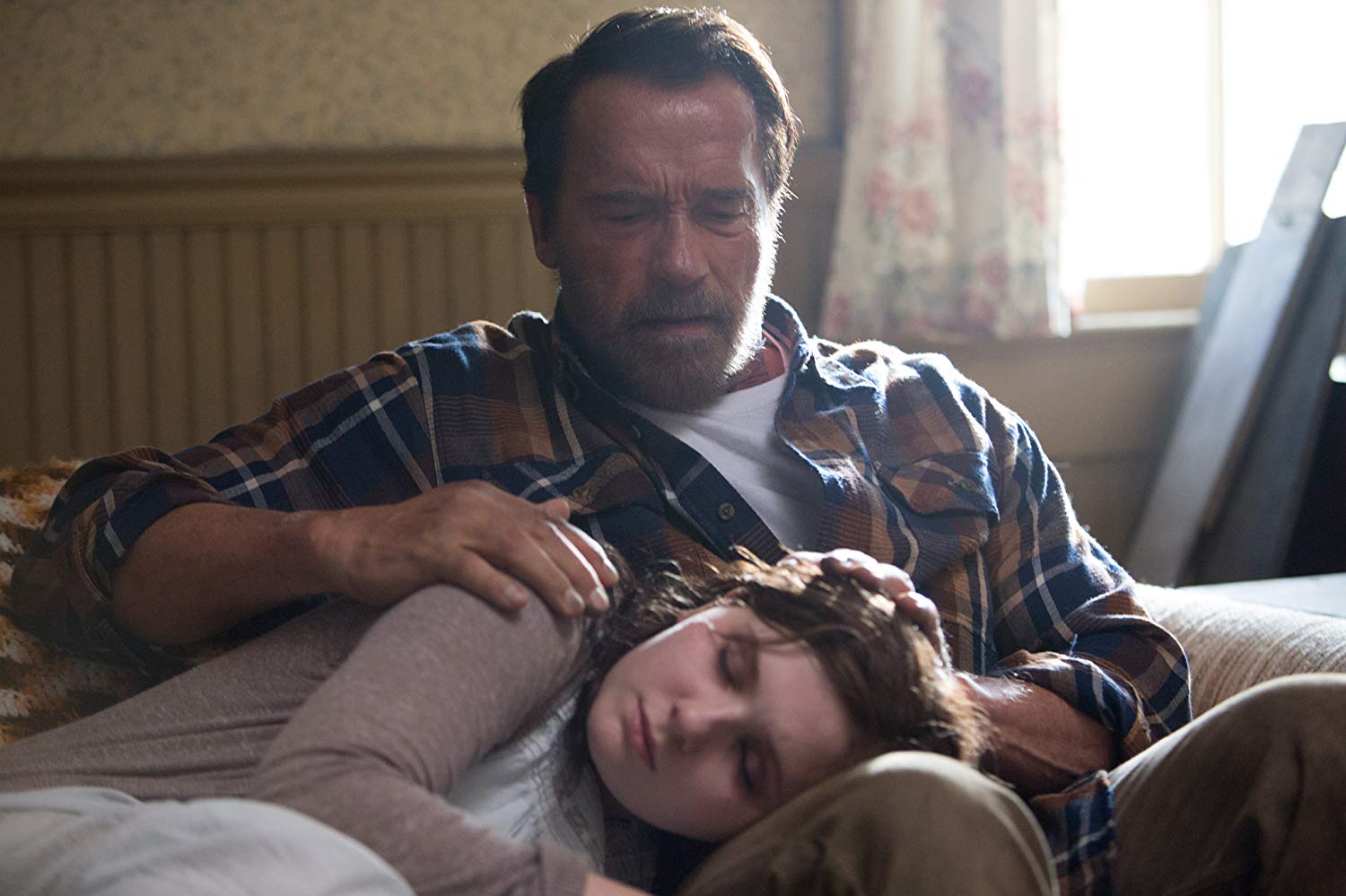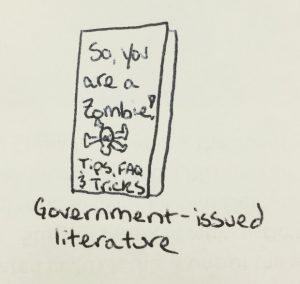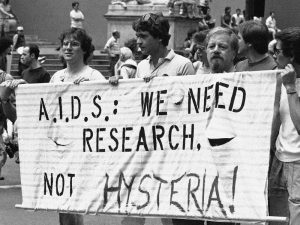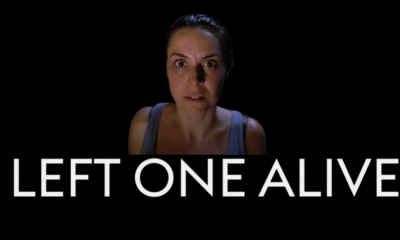
Review: 2015’s “Maggie” is a Midwestern Drama with Zombies
I think that one of the reasons that people find the zombie genre is so popular is because it’s so relatable. In every point of history, there has been a very legitimate fear of infection, and of becoming part of a huge mass of the unidentified/unnamed/unclaimed waste left in its aftermath. It’s a terrifying thought to have to watch your body rot and decay into something inhuman before your own eyed. Just as there’s a complex horror of being swallowed into an unmarked mass grave, full of other rotting husks of unknown strangers.
And of course, the more bureaucratic nightmare of quarantine – the loss of control over one’s freedom, autonomy and body. The isolation of being a number in a system, a statistic to be glossed over in news reports, or worse, totally neglected by the system built to serve and protect you as a citizen.
At the time of this review, the world is rocked by the Corona virus. Clips of videos and pictures on the internet show people being removed in hazmat protection, portions of cities blocked off for quarantine, and countless people reacting to fake or real bouts of public sickness. Borders have been closed. PPE has been sold out completely online.
Before that was Ebola, H1N1, SARS, Bird Flu, Hantavirus, The Spanish Flu, Tuberculosis, Rabies, Leprosy, The Black Death…
And, something more akin to this movie – the HIV/AIDS epidemic. But before we get into all that…
The Plot:
Maggie, played by Abigail Breslin, has just been given a death sentence – she’s been bitten by an infected person and is now positive for a disease that’s been ravaging the entire US. After trying to run away, she is picked up by her father and taken back to their house in the quiet countryside to await her fate. She’s given only a few weeks to spend with her family before being forced to suffer her final days isolated in quarantine.
During her time at home, she must come to accept her mother’s past death, learn to forgive, and face her mortality while losing her agency and body in the process as she becomes sicker. She experiences the fear and ignorance of even her closest loved ones as she becomes less and less of Maggie and more of something else entirely…
The non-spoiler reveal:
There’s no way around this: Arnold Schwarzenegger plays her dad.

It’s…unfortunate and, frankly, jarring to see older Arnold play a Midwestern farmer and father to a young twenty-something (and father to even younger children). And it’s not to say that he doesn’t try in this film, because he does.
And he does a good job at acting, but what probably drew a lot of people to watch this movie (me included) was what ended up hurting it – it’s an Arnold Schwarzenegger zombie movie at the end of the day. No matter how it’s packaged, that’s what’s going to stick in people’s minds and when this slow-burn drama starts unfolding, it’s…well…

(snob glasses affixed) In “Genre And The Invention Of The Writer”, especially when examining Foucault’s “author-function”, Anis S. Bawarshi said:
“The author-function does not refer to the ‘real’ writer, the individual with the proper name who precedes and exists independently of the work. Instead, it refers to the author’s name, which, in addition to being a proper name, is also a literary name, a name that exists only in relation to the work associated with it. The author-function, then, endows a work with a certain cultural status and value. At the same time, the author-function also endows the idea of ‘author’ with a certain cultural status and value.”
https://www.jstor.org/stable/j.ctt46nxp6.5
“The author-function delimits what works we recognize as valuable and how we interpret them at the same time as it accords the status of author to certain writers”
https://www.jstor.org/stable/j.ctt46nxp6.5
I know, you’re thinking, ‘But Brannyk, doesn’t that work in favor of the movie? The reason that we’re talking about the movie right now is because of Arnold “Put That Cookie Down” Schwarzenegger? And also, what happened with the HIV/AIDS talk?’
We’ll get to HIV/AIDS in a minute. First, yes, Arnold and Abigail Breslin’s (but we know it’s Arnold) capital is what drew people in. In fact, that reliance on his capital was incredibly faulty direction that the marketing took – relying on (and exaggerating) the scarce action scenes of the movie. They even went as far as to hype the movie with the most ridiculous tagline: “Don’t Get Bitten” as a way to sell Action-Arnold, and not Midwestern old-dad Arnold.

It’s no wonder that, while it fared well with critics, it bombed hard, not even making back its budget (which probably mostly went to the salaries for the actors, as there was limited effects and locations).
And it’s a shame because “Maggie” is a fresh take on an old trope. And so, patient reader, we get to HIV/AIDS.

Brain Roll Juice:
“Maggie” is not the total chaos and calamity of most zombie outbreak movies. It’s an epidemic, yes, but as we see government-issued brochures given to Maggie, as we hear NPR news reports, and boring, routine doctor visits – this is not a collapsing society situation. Yet, there’s fear and prejudice against those infected. There’s ignorance. Some of it is rational – they are living in the country, where everyone knows everyone and resources are reserved for the larger cities. Maggie is seen as a victim, a carrier, a ticking time-bomb, a troublemaker, and an innocent child.
During her own time of accepting her virus and fate, friends and loved ones try understand how this change will affect them – some say goodbye, some turn away, and some give into prejudice and ignorance.
Throughout the movie (whether intentional or not) the interactions with the community, the government’s awkward involvements, and the sickness itself (not the cannibalistic part, though, duh) is reminiscent of the HIV/AIDS epidemic of the 80’s-90’s. Maggie as a “carrier” of a deadly and mysteriously disease that is clumsily handled by government officials and little understood by the general public pulls a lot from history. We see Maggie losing agency, little by little, with her choices and her own body as she is slowly succumbing to the virus. We see more government intervention by way of law enforcement and medical staff, even when trying to help her. We see her own friends misunderstand her and the community at the brink of hysteria.

In fact, when questioned about the school re-opening and asked whether he would send his child to school with a child with the disease, the mayor of the town had this to say,
“I’m glad I’m not faced with that problem today, and I can well understand the plight of the parents and how they feel about it. I also have compassion, as I think we all do, for the child that has this and doesn’t know and can’t have it explained to him why somehow he is now an outcast and can no longer associate with his playmates and schoolmates. On the other hand, I can understand the problem of the parents. It is true that some medical sources had said that this cannot be communicated in any way other than the ones we already know and which would not involve a child being in the school. And yet medicine has not come forth unequivocally and said, ‘This we know for a fact, that it is safe.’ And until they do, I think we just have to do the best we can with this problem. I can understand both sides of it.”
Just kidding. That was Reagan in ’85. A full two years before forming the President’s Commission on the HIV Epidemic in ’87. And that was after AIDS was named in ’82 and HIV identified in ’82.
Any who, what I’m getting at is that there are similarities that make this a familiar ride in an old trope that I found refreshing, surprisingly rewarding and genuine. While I hope this nod was deliberate, the zombie virus itself pays homage to very real and very deadly diseases in our world as I stated before and while the scary zombie move is fun, this was a good stroll into what other facets the zombie genre could tell. Familiar stories. Heartbreaking stories. Vulnerable stories of communities trying to recover and survive; families learning how to deal with loss and say goodbye; and victims finding agency (in small or big ways) within their suffering and their final moments.

Bottom-line:
A slow drama with Arnold Schwarzenegger and zombies. If you feel like you’re up to that, give it a go.
 (3 / 5)
(3 / 5)
Movies n TV
Wheel of Time A Question of Crimson Is a Political Espionage Delight
Episode two of Wheel of Time felt like the beginning of a long journey. Stories are unfolding, lives are changing, and blood is spilling.
Let’s discuss.
The story
We begin this episode in the past with Elayne’s mother, Queen Morgase. It turns out her rise to the throne was a bit, shall we say, cutthroat. So when she shows up at the White Tower, Siuan is concerned.
She might have reason to be, too.
Meanwhile, Rand, Egwene, Moiraine, Lan and Aviendha are in the Spine of The World. As they travel through some of the most breathtaking lands I have ever seen on a TV show, Egwene is plagued with nightmares. We think at first that’s just her trauma working itself through her system. But we soon find out that it might not be that straightforward.
Finally, Perrin returns home to heal after his hand is almost cut in half. But when he gets there he finds the town has been infested by Children of The Light. And they’re looking for him.
What worked
There was something heartwarming in this episode about political espionage and choking religious persecution. And that is Elayne’s relationship with her family.
I have consumed a lot of fantasy content with royal families. And I have never once heard a princess call her mother ‘Mum’. I’ve never seen royal siblings get along. And I have sure as hell never seen a princess have a good relationship with her step-parent.
This was refreshing. Even though Queen Morgase is kind of a horrible person she seems like a good mother. And that’s an unexpected delight.

Of course, this is just one storyline among many. And while this can sometimes be overwhelming, in this case it wasn’t.
I’ll be honest, some of these storylines are going to drag for me. I know this because I’ve read some of the Wheel of Time books and I have an idea that not all the characters exactly pique my interest.
No one likes all the characters. No one likes all the storylines. While I am here for the political espionage between Queen Morgase and Siuan, not everyone likes it. While others might be fascinated with Selene trying to win Rand back, I couldn’t care less.
Having multiple storylines keeps everyone’s attention better. So long as things don’t get out of hand. Things can easily get out of hand. But this seems to be managed well.
So far.
What didn’t work
As I mentioned above, I’m not thrilled with Rand’s story at this point. And while it’s fine to not like a storyline when there are this many to choose from, it’s not fantastic that the one I like the least is the one involving our two main characters. And anytime we were with the team at the Spine of The World, the only thing that brought me joy was Moirain’s hat. It reminded me of Stockard Channing’s hat in Practical Magic.
The problem is that Rand is Charlie Brown with controversial magical powers. He is boring, serious, and pessimistic.
And yes, I understand that he has a heavy emotional burden and he’s the Dragon Reborn and that’s quite taxing and all. But let’s be fair, there isn’t a single person in this show that doesn’t have a heavy burden. And most of them manage to be fun occasionally.

All that being said, this episode of Wheel of Time did exactly what it needed to do. It set up conflicts at each of the three locations. It established emotional ties between the characters and the events. And it established goals for everyone.
This was, in short, a solid episode. Not groundbreaking, not mind-blowing or life changing. It was simply good. It was entertaining and moved the plot forward.
Well done.
 (3.5 / 5)
(3.5 / 5)
Movies n TV
Wheel of Time Returns With A Bang
Wheel of Time is back for season three. There are mixed feelings regarding this. Last season, there were some serious pacing issues. And some serious sticking to the book’s storyline issues. But we’re two seasons in, and we don’t give up so easily. So let’s dive into episode one, To Race the Shadow.
By the way, I highly recommend watching this episode with the subtitles on. You’ll see why.
The story
We begin this episode with Liandrin facing a trial of sorts for her rampant betrayal. She does her best to gaslight her Aes Sedai sisters into thinking that Siuan Sanche is the real traitor.

When that doesn’t work, she reveals how many Black Aes Sedai have actually infiltrated the tower.
Spoiler, it’s a lot.
In the aftermath, our whole team gathers to drink and enjoy one night of relaxation before they head out to the Tear to form an army for Rand. All is going well until they’re attacked by myriad creatures and a sentient axe.
What worked
This episode was long. It had a run time of an hour and eleven minutes. And a lot of that run time was spent in heavy dialog scenes.
Fortunately, these were well-done scenes.
If you’re going to have a lot of talking scenes, there are good ways and bad ways to do it. Last season, we saw lots of examples of the bad way to do it. But this episode did it well. For one thing, other things were going on while conversations were taking place. The characters are drinking, playing games, walking through an interesting city. And the scenes themselves didn’t stretch out. They weren’t repetitive. We heard what the character had to say, then we moved on.
It was also nice that the point of these scenes wasn’t just info dumps. We had character development. We had romantic interactions. We had plot development and foreshadowing.
Overall, this episode felt like what it was. A moment of calm before a storm.
Taking a step back, I’d be remiss if I didn’t address the fight scene at the start of the episode. Because it was epic.
The magic looked amazing. The martial arts that went along with it looked fantastic. The costumes were beautiful. It was just incredibly fun to watch.
More than that, it was emotional. We lost some characters in that fight that were important. And it was clearly emotionally shattering for many of our characters, who found themselves betrayed by people they trusted.
So many of them.
It was a great way to open the season.
What didn’t work
Despite that, this episode wasn’t without its flaws.
First off, there were a lot of dialog scenes. And they were good scenes, as I’ve already discussed. But it was one after another after another. And when your episode is, again, an hour and eleven minutes, it’s maybe a little much to have so much chit-chat. Couldn’t some of these conversations, important as they were, have been moved to maybe another episode?
Finally, I want to talk about Egwene’s travel through the arches.

I feel like maybe there were some deleted scenes here. Because there must have been more to that visit than what we saw, right?
We could have seen Egwene battle Rand. That would have been badass and emotionally devastating. We could have seen her with a quiet life with Rand back home at the Two Rivers. We could have seen anything except for the quick clip of Rand in a bloody river, followed by Egwene being shoved back out in a bloody shift.
Bad job. But at least it wasn’t an extended scene of Moiraine collecting bathwater, and then taking a bath while looking sad. If we’d started this season with another scene like that, it might have broken my brain.
Amazon dropped the first three episodes at once. So we’ll be back soon to talk about episode two. See you then.
 (4 / 5)
(4 / 5)
Movies n TV
Entertaining as hell: Eight Legged Freaks (2002) Review
Early 2000s is a special era for the industry. It accepts the cheesiness and corniness of movie making, in turn producing some gems in their own right. Eight Legged Freaks starring David Arquette and young Scarlet Johanson is a horror comedy about giant spiders who overtake a small town. As crazy as that premise sounds, the movie surprisingly has a ton of heart and is super entertaining. Let’s review, shall we?
Plot
We start Eight Legged Freaks with a shot of toxic waste spilling into the water supply of Joshua, a spider farm owner. He is friends with Mike, one of our protagonists, who is a science geek and a spider enthusiast. Mike notices something quite right upon visiting Joshua, but no one takes him seriously. We are then introduced to the rest of the crew. Mike’s mother Samantha, the town sheriff, is too busy chasing Ashley, his sister, who is dating the town mayor’s son Bret (something Samantha does not approve of). We also have Chris, who returns to the town to save his father’s legacy in the town mines. He has opposition from Wade, Bret’s father, who wants to use the mines for his business ventures. Lots of drama going on that will only get juicier once the spiders get loose.
The creepy crawlies quickly dispose of Joshua and make their grand appearance after Ashley rejects Bret’s advances, abandoning him in the middle of a desert. A glorious chase sequence ensues as the spiders make their way towards the town, wreaking havoc on its residents. In a true horror fashion (which the movie acknowledges), it takes some convincing from Mike and then from Samantha for the town to take the threat seriously. The tongue-in-cheek style of narrative adds the comedy aspect to a movie that would otherwise burn out fairly quickly.
The remaining characters hide out in a shopping mall as it’s the only somewhat sturdy building in the area. This doesn’t last long as the spiders break in, forcing them to run through the mines. Their resources to fight the creepy crawlies off are limited as the methane gas doesn’t allow them to use firearms. Such conditions require resourceful thinking from Chris, who uses perfume to fend off the leader of the spider group and save himself during the climax of the movie.
Character dynamics are not forgotten once the action kicks in. We have Chris confessing his long-term feelings for Samantha which she knew all along, which provided some comedic relief. Bret also reunites with Ashley and apologises for being an asshole. Mike finally gets the appreciation he deserves as his knowledge saves the townsfolk more than once during the whole ordeal.
We end the movie with the town’s radio show person telling the story as an urban legend during his segment. This brings it into question – how much of it happened the way he said it did? We can only guess…
Overall thoughts
Eight Legged Freaks is a fun creature feature with some self-aware commentary on genre tropes that doesn’t take itself too seriously. The acting is good, the pacing fitting and the characters are likeable enough for you to want them to make it through. Definitely a must watch, if you don’t suffer from arachnophobia, that is.
 (5 / 5)
(5 / 5)













